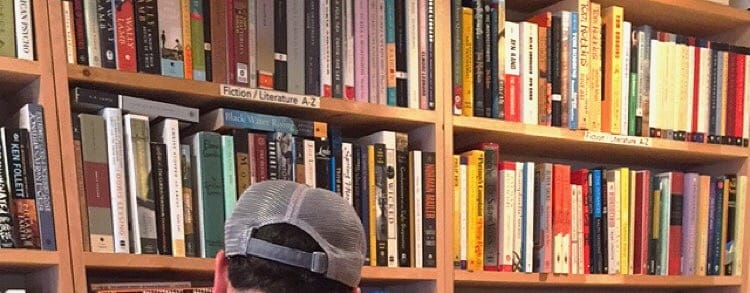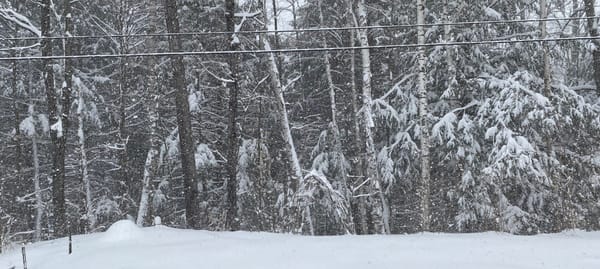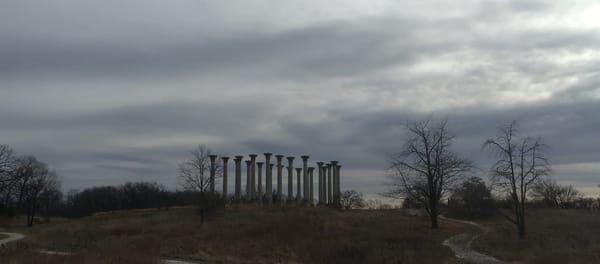What is 'Jewish English Major'?
We’ll discuss novels and essays and short stories and films. We’ll consider current events in their cultural and rhetorical contexts. We’ll ask abstract questions about the nature of art and try not to be too didactic about it. We’ll take a beat to appreciate a thing for its own sake.

Two questions: what does Judaism do, and how?
Nearly three years ago, I attempted an answer at the conclusion of an essay in the Jewish student publication New Voices (for which I barely qualified as a 33 year old MFA student) about toxic masculinity in the institutional culture of the Reform movement:
“If you ask me about Judaism on one foot I will tell you that it pushes us to build a relationship with the portion of the world that is immaterial but insistent. Dignity, principle, compassion, accountability, repentance, grace. Justice. None of these is an object in the world–but if they weren’t real, if they weren’t important, then we wouldn’t have names for them.”
So what does Judaism do? Pushes us to connect with immaterial but insistent things. How? We name them, or: we use language. We talk. We read. Words and texts, conversations and stories. Conversations about stories. Conversations over meals. Ritual conversations about stories over meals. Recorded conversations studied in conversational duets. Commentaries, blessings, prayers, and poems. The wordless language of a niggun, the expressionless language of silence. Judaism happens in communication.
I love language, perhaps to a fault. Good books and good conversation are my two favorite ways to pass time. I am rarely quiet, unless I am reading.
Reading means a lot of different things to a lot of different people, and for me the Jewish part of it feels distinct–like I am accessing Judaism when I read, even if there’s nothing overtly Jewish about what I am reading. My father is a rabbi. I spent eighteen summers at a Jewish summer camp and a semester of high school in Israel; I am not lacking in overtly Jewish influences on my identity, my Judaism. But somehow, reading feels to me like it also belongs on the list.
This is where this newsletter starts: making the connection between reading and Judaism more meaningful by writing about it and hopefully building some measure of community around it.
I am not a rabbi. I am a writer and a reader. That’s why this is named Jewish English Major, because I am pursuing this project in the spirit of my time in the English department of my undergrad, and the low res MFA where I learned to write fiction. So my methods will more closely resemble the day-to-day work of an English major, playing a game of meaning-making by taking language seriously.
A lot of literary studies already parallels Jewish study. At the heart of each is close reading–understanding how the text functions on its own terms, considering how the language accomplishes its effect. There’s also intertextuality–what do texts say alongside each other? How can we create meaning from the space between them? These questions live with equal comfort in a beit midrash where students study Talmud in pairs, and a university classroom where a professor of 19th century British literature facilitates conversation about the novels of George Eliot and Jane Austen.
Many English departments include concentrations in film studies, folklore, comparative literature. They have faculty who employ a variety of critical approaches that can help orient us to a text, providing aesthetic, cultural, historical, political contexts. The English department where I finished my undergrad also housed the Cultural Studies PhDs, who apply the idea of a text to all sorts of fun things: IHOP menus, public transit systems, wellness MLMs. So the “English Major” moniker allows us to establish a pretty broad range of interests. For example, I’d love to post here sometime soon about what we can learn about how to read the stories of the Tanach from the way Australian director George Miller conceives of his film franchise, Mad Max.
And English departments include the dreamers like me who concentrate in creative writing, an academic pursuit which, in addition to learning how to write—or more accurately to my experience, learning how to teach oneself to write—teach a whole other way of staying very close to the text, to regard language as something to be wrestled and wrangled and massaged.
We’ll discuss novels and essays and short stories and films. We’ll consider current events in their cultural and rhetorical contexts. We’ll ask abstract questions about the nature of art and try not to be too didactic about it. We’ll take a beat to appreciate a thing for its own sake.
Growing up as a liberal Jew, I sometimes worry that many Jews on my end of the observance spectrum shy away from meaningfully exploring ideas of faith and religion outside the realm of social justice. And while there is a foundational Jewish mandate, as old as the Torah, to help the stranger, care for the community as a community, and make the world whole, social justice is not enough.
Pirkei Avot teaches that the world stands on three things–study, prayer, acts of humanity. The social justice framework speaks, powerfully at times, to the economic and political aspects of our lives, provides Jewish language and a Jewish sense of moral purpose to our participation in a market, in a political structure. But I want a Judaism that functions to remind me I am not part of a market, I am part of a story. A Judaism that celebrates the meaning and wonder of narrative and imagination, partaking of a bountiful vastness beyond the transactional dimensions of life. Religion can be a place we go to affirm a broader, messier, more difficult, more beautiful truth. A place of intuition and discernment and love. A place to tend the garden of our deeper selves.
I suspect that many Jews like me shy away from Jewish conceptions of faith and belief because we assume that there isn’t a way to Jewishly plug in to them without adopting the practices and prayer life of Orthodox Judaism and its associated rigidities. I believe literature and the humanities, in addition to their own self-evident merits, can be a vessel for this sort of Jewish searching, a way of exploring Judaism in idioms that are more familiar to contemporary life. There is opportunity in consciously and intentionally importing concepts and materials from the humanities–philosophy, language, history, art–into Jewish study, which for the purposes of this newsletter means both “searching for the immaterial and insistent portion of existence”, and “the act of making sense of living Jewishly in and moving Jewishly through the world”.
And the opportunity is mutual; liberal Judaism also has something to offer the humanities–a place to thrive. In America today, AI proliferates, devaluing art and diluting meaningful insight. Universities STEMify and transform into white collar trade schools. The academic labor market is subsumed into the gig economy. These problems are particularly astute at public universities, which were once the backbone of a sort of unassumingly progressive civic intellectual infrastructure that provided social ballast from the sweeping capitalist ideologies of the market. Just look at what's happening to the University of West Virginia. Add to that the book banning movement, the financialization of the entertainment industries, and the commodification of human attention. Institutional and normative support for art and labor that investigates the human experience has never been lower in my lifetime.
The Jewish English Major dreams of a 21st century Judaism that loves and stands up for the humanities and the Enlightenment, and, in doing so, doubles down on that part of Judaism that embraces nuance and complexity while refusing to negate the existence of moral absolutes.
Let’s talk about the paywall. A lot of this newsletter is free to all subscribers. We'll do a lot of Jewish non-Jewish reading, where we look at fun/good/beautiful non-overtly Jewish books in a Jewish way. We’ll check in regularly with the goings on of the Jewish calendar. And there will be some personal essay, taking a cue from one of my favorite digital newsletters, Diana Butler Bass’s The Cottage.
And then there will be the content behind the paywall. In my wildest dreams, I would have the time and means to build out this part of the newsletter, but for now we’re starting here:
$5/month, $54/year | American Zionism and Israel posts
I have been writing—journaling, essentially, for the first time in my life—about Israel for the better part of a year. More specifically, I’ve been writing about Israel and antisemitism and American politics, about relations cleaving all around me, about tenuous stratagems for negotiating these topics in conversation depending on my context. For the next year, I want to channel that energy into something useful, think deeply and critically about two things:
1) I will reflect on the ways I succeeded and failed to teach Israel to Jewish teens I worked with between 2009-2020. How I wish I had been able to empower them to shape their own attitude toward Israel. Not by focusing on what to feel, think, know, or say about the State of Israel. Instead, teaching about a complex set of Jewish historical conditions, religious and cultural narratives, theological commitments, each of which is fundamental to the Jewish project, and all of which intersect on the land of Israel. In short: teaching about why Israel is complicated rather than trying to make it simple. Making space for younger Jews to find agency in that complexity, room to build out their own beliefs and attitudes and politics.
2) The rupture between Jewish American anti-Zionism and progressive Zionism. The fraying relationships between progressive American Jewish Zionists and anti-Zionists. The anxious frustration, feeling caught in the tension between these two tribes.
The anxious, frustrated waiting for recognition by Jewish anti-Zionists of the complex questions of identity that each Jew has the right to settle in their own way and on their own terms. And recognition that, given this complexity, there exists a range of progressive ideological and political positions under the Zionism umbrella which are not worth rejecting or demonizing prior to investigation, and which it is politically useful to regard as partners in the work.
The anxious, heart-breaking waiting for acknowledgement by (some progressive) Zionists–particularly at the national level from the leaders of my ‘movement’–that the death and destruction being perpetrated in Gaza in the name of the Jewish state is, at best, morally corrosive and geopolitically costly in the long term. That it is not somehow un-Jewish to feel it is far worse than that. And that, in any case, we have passed the point where the disproportion of the response is only justifiable in the barest and basest of human terms.
And recognition that, to the extent anti-Zionism comes from a place of aspiration and well warranted skepticism of both nationalism and state power, there is something to respect in the moral absolutism of this position–I’ve always admired the Bund.
Why is this writing going behind the paywall? Writing (semi)publicly about Israel, which I am doing right now for the first time, is daunting in a way that is hard to describe. I am irresistibly aware of my father’s long career as an outspoken liberal Zionist in his pulpit; inescapably implicated and perversely enticed by the anti-Zionist absolutism of many of my non-Jewish friends on the left; honestly scared to ask them to consider my point of view as the Jew that I am.
So this part of the project feels vital, but writing with both of these audiences in mind floods my throat with anxiety, demands deep attention. And that takes us here:
1) I don’t want to do this for free
2) I want the readers to have some investment in it, even if it’s just financial, because it feels good to know the people I’m emailing about Israel and American Zionism have opted in to it in a very intentional way
You can expect 2-3 of these a month, and not always directly attentive to current events—I mean, the first post starts at the Babylonian exile.
Tl;dr: The paywall is for the harder stuff. For now, that’s Zionism.
$54/month, $540/year | Posts + notes/edits on one document/month
Everything from the tiers above, plus notes/edits/feedback on one document each month of the subscriber’s choosing up to a maximum of six pages, double spaced. Newsletter columns, job app cover letters, blog posts, op-Eds, an email you’ve been meaning to send your boss–send it my way, once per month.
For the next few weeks we’ll be in table setting mode, digging into the themes and preoccupations that compelled me to launch this newsletter. For example, our next posts will reach back to the origins of reading and Judaism in my life with an essay about each of my parents and their immense influence on both. After that we will launch the Jewish Non-Jewish Book Club with one of my favorite novels of the 21st Century, Station Eleven by Emily St. John Mandel. This first book club post will also explore the tension between a “Jewish values” lens and a “Jewish themes” lens when considering literature and art. After that we’ll begin to unpack what I think I mean when I say this newsletter believes in God (but doesn’t put a dash in the word).
If you’re reading this in an email and you’ve made it this far, I encourage you to forward it on to anyone in your life who might find it interesting. And if you aren’t subscribed, I invite you to do so here, at any level. You may even find that you have something to contribute to the project; I would love to host reader essays if that ever makes sense in this space. In the meantime, if you have something you’d like to add to the conversation, feel free to reply at jewishenglishmajor@gmail.com and share your thoughts. I’ll round up a selection of replies and share them here as we go.
I hope you will keep reading as I experiment with my approach and learn how to engage publicly with this thing I am trying to build. I will keep pushing towards the immaterial insistent in my bookish, Jewish way.
Take care,
az



